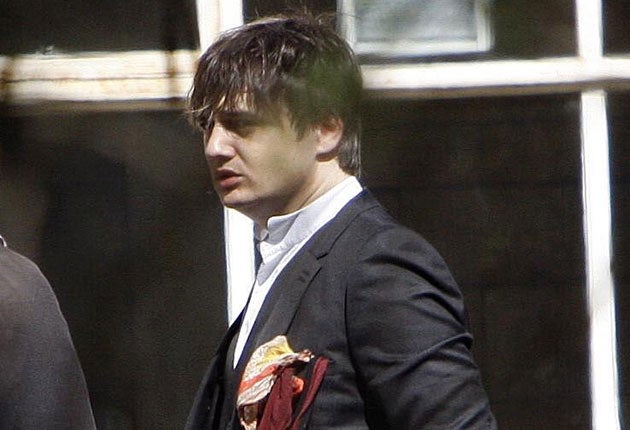Joan Smith: Pete Doherty is not a child

Your support helps us to tell the story
From reproductive rights to climate change to Big Tech, The Independent is on the ground when the story is developing. Whether it's investigating the financials of Elon Musk's pro-Trump PAC or producing our latest documentary, 'The A Word', which shines a light on the American women fighting for reproductive rights, we know how important it is to parse out the facts from the messaging.
At such a critical moment in US history, we need reporters on the ground. Your donation allows us to keep sending journalists to speak to both sides of the story.
The Independent is trusted by Americans across the entire political spectrum. And unlike many other quality news outlets, we choose not to lock Americans out of our reporting and analysis with paywalls. We believe quality journalism should be available to everyone, paid for by those who can afford it.
Your support makes all the difference.I suppose it's one way of seeing whether short prison sentences work: the singer Pete Doherty was released on Wednesday after serving less than two months of a six-month sentence for possession of cocaine. It was his third spell in jail, and the judge who sentenced him remarked on his "appalling record", which includes at least 13 previous court appearances. Doherty has been arrested many times for drug and driving offences, and he could face another prison sentence after allegedly breaking into a record shop in Germany in March.
His latest conviction followed a shocking series of events which concluded with the death of a young film-maker, Robyn Whitehead, who had been making a documentary about Doherty. He was cleared of any involvement in her death from a heroin overdose, but Whitehead filmed herself and Doherty smoking crack cocaine a couple of days before she died. It wasn't the first unnatural death to have taken place in Doherty's circle; an actor called Mark Blanco fell from a balcony at a flat in East London in 2006 shortly after a confrontation with Doherty.
This is a pretty terrible history. "He takes no pleasure in his addiction," Doherty's lawyer said in May. "He is acutely aware of the agonising nature of addiction." But I'm still not sure this is how fans of his bands Babyshambles and The Libertines view the singer, while music sites sometimes behave as though his criminal record is little more than an inconvenience to his singing career.
Addiction is far from being a secret in the music world. Amy Winehouse's latest tour had to be cancelled when she appeared on stage in Belgrade so drunk she could hardly stand. But there's a tendency to treat stars such as Doherty, 31, and Winehouse, 27, as wayward children, instead of adults with extremely serious and possibly life-threatening addictions.
In 2005, Doherty was championed by Sir Elton John, who invited him on stage for what turned into a cringe-making joint performance at Live 8, and the singer repaid him with the accusation that the fiasco had been the fault of John's band. In May this year, just before he went to prison, he complained that he hadn't been invited to Whitehead's funeral, berating her father as a "deranged old silly".
These are not the actions of someone who is emotionally mature, but attitudes to Doherty are confused by the UK's irrational drug laws. The right is prone to moral panics and demands for bans, while legalisation campaigners sometimes behave as though recreational drug use is problem-free. Doherty and Winehouse are proof of the damage addictions can do to talented human beings and they both appear to be stuck in a destructive cycle. Doherty had barely emerged from his latest sentence when it was announced that he was going to appear at a gig in North London yesterday afternoon, timed to allow him to observe an evening curfew.
Sometimes performers agree to a punishing schedule for financial or career reasons. But they're often anxious individuals who crave the attention of fans and the adrenalin rush of performance. It's another species of addiction, and the myth of the tortured artist is at hand to glamorise what would otherwise look like wilfully self-destructive behaviour. Michael Jackson's untimely death is a reminder that drug dependency and the apparently limitless indulgence of fans can prove a toxic combination.
Join our commenting forum
Join thought-provoking conversations, follow other Independent readers and see their replies
Comments